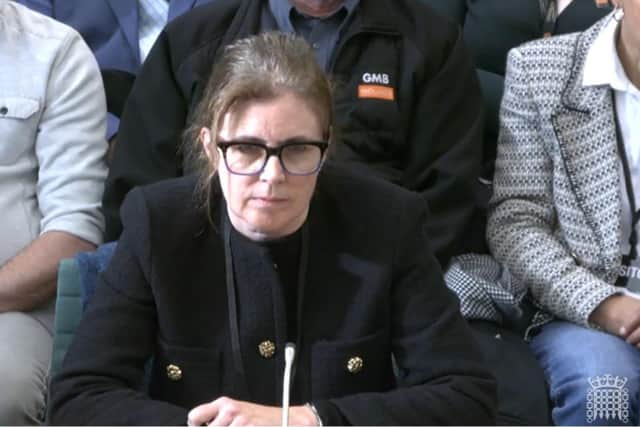Wilko collapse: Watch moment boss Lisa Wilkinson tells MP she 'let down' Wilko staff and shoppers after collapse
and live on Freeview channel 276
The former boss of high street retailer Wilko has said Liz Truss’s mini-Budget last year was a contributing factor to the chain’s collapse in the summer. Giving evidence to a committee of MPs in Parliament, Lisa Wilkinson - who was chairman of the eponymous high street shop which was started by her family 93 years earlier was asked whether she was “burgling a failing business”, over £77m worth of dividends taken out from the company in the decade prior to its collapse.
But she said Liz Truss’s unfunded tax cuts, which caused panic in financial markets and sent interest rates soaring, were “an external contributor” to the store’s demise.
Advertisement
Hide AdAdvertisement
Hide AdThe budget store chain entered difficulties in 2022 causing Barclays to recall a loan. Ms Wilkinson explained how the company was in discussions with Australian financial giant Macquarie to secure new funding to sustain the business when the mini-budget sent interest rates soaring.


“We were about to enter into secured lending arrangements with Macquarie when the 2022 mini-budget happened,” she said. “Literally we were in the midst of that, and at that point the interest terms on that loan were hiked massively and that became infeasible. So, that was a contributor.”
The company’s collapse in August this year led to 12,000 job losses and uncertainty over a pension fund worth £50m.
Ms Wilkinson was being asked questions by Parliament’s Business and Trade Committee yesterday. She denied that she had used dividends to pay herself in a “personal capacity”.
Advertisement
Hide AdAdvertisement
Hide AdShe added: “I don’t recognise that statement that we are one of the wealthiest families in the country, and I don’t have assets to fill a £50m hole in the pension scheme.”
Elsewhere in the session she had said she was “devastated that we have let each and every one of those people down with the insolvency of Wilko.
“I don’t know how to put into words how sad I am that we have let down all our team members, all our customers, our suppliers, and our advisers.”
Asked why it had taken until yesterday’s session in Parliament to say “sorry” to staff who had lost their jobs, Ms Wilkinson appeared visibly upset.
Advertisement
Hide AdAdvertisement
Hide Ad“Before Wilko went into administration, or it might have been shortly after … I asked to do an announcement to all team members to thank them, but the advice from the directors and the administrators was that I should not do that. Subsequently, I have responded to anybody who messaged me, and I am not difficult to get hold of.”
A number of issues combined to weaken the retailer’s financial position, including an “enormous mistake” in 2018 according to former chief executive Mark Jackson.
Mr Jackson, who joined Wilko in December 2022, revealed the company purchased products from abroad in 2018 with US dollars, which led to a loss of £40m from the company’s balance sheet.
“I came in knowing that the business was in distress and that there was a window of opportunity to turn it around,” he said. “A number of things went against us. I still think this business should exist and I think somebody should have invested in it.”
Advertisement
Hide AdAdvertisement
Hide AdEarlier, Atul Shah, professor of accounting andfFinance at City University, London, told the committee “auditors didn’t do their jobs” when assessing Wilko’s prospects. Pressed by MPs about whether PwC and EY had failed, he replied, “without any doubts”.
The committee hearing concluded with Malton MP Kevin Hollinrake being asked in his role as a minister in the Department for Business and Trade about the structural issues that have led to the taxpayer being on the hook for £40m in redundancy payments. Asked about the strength of watchdogs in industry, Mr Hollinrake pointed to the fines issued last year by the Financial Reporting Council to auditors including KPMG and Carillion, “for not doing their jobs correctly.”
"We want to see a free market where the UK’s an attractive place to do business and we don’t want to put unnecessary burdens on business,” he said.
